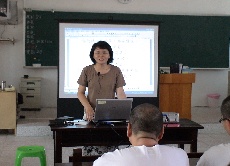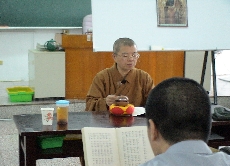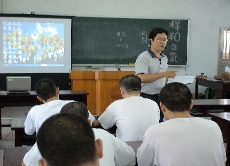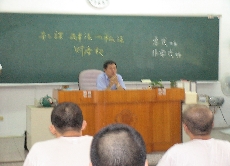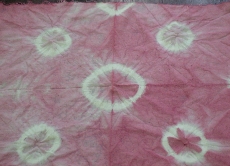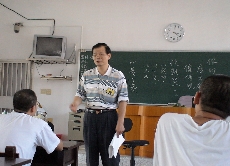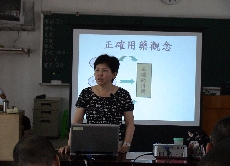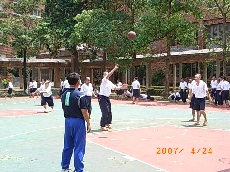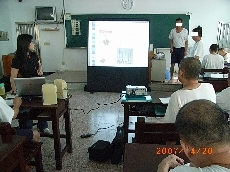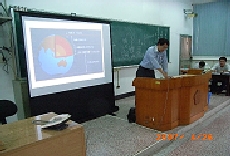Rehabilitation Treatment Courses and Activities Area
- Publication Date :
- Last updated:2023-06-14
- View count:2495
Courses in Stages for People Receiving Compulsory Rehabilitation Treatments
【3 Stages of Compulsory Rehabilitation Treatment】
Pursuant to articles set out in the Narcotic Hazard Prevention Act, offenders are to receive compulsory rehabilitation programs at a rehabilitation center for a minimum of six months, and a maximum of one year. For people receiving rehabilitation treatments, initial investigations, inductions, and evaluations will be conducted. Thereafter, the rehabilitation education programs will be implemented in 3 stages accordingly. Respectively, these 3 stages are: adjustment period, psychological counseling period, social adaptation period. Objectives and course contents of each treatment are as follows:
A. Adaptation period
1. Duration: three months.
2. Objectives: the primary purpose of the adjustment period is to enable the illicit drug abusers under treatments to develop their stamina and perseverance, thereby enhancing their confidence in eliminating drug dependency.
3. Course content: the focus for illicit drug abusers under treatments, is to encourage regimented lifestyles and to participate in social adaptation courses.
B. Psychological counseling period
1. Duration: three months.
2. Objectives: the primary purpose of the psychological counseling period is to stimulate the illicit drug abusers’ motion of eliminating drug dependency and starting new lives, thereby assisting them in exterminating their psychological dependency on illicit substances.
3.Course content: the focus for illicit drug abusers under treatments, is to encourage regimented lifestyles, to acquire informed knowledge on illicit substances, and to participate in counseling courses.
C. Social adaptation period
1. Duration: two months..
2. Objectives: the primary purpose of the social adaptation period is to rebuild the illicit drug abusers’ interpersonal skills and problem-solving abilities, thereby helping them re-establish new lives in society.
3. Course content: the focus for illicit drug abusers under treatments, is to encourage regimented lifestyles, to make use of social resources, and to participate in social adaptation courses.
【Details of associated courses】
A wide array of courses is organized in the Center to enhance the lives of illicit drug abusers under treatments; they are encouraged to learn new skills to improve self-esteems, ideas on family and society, and to step up to lives without substances. Courses include sports and activities, religious studies, adaptation to life in the Center, addiction studies, legal education, health education, studies in humanities, professional treatments, counseling, work and leisure, career counseling and assistance, etc. These courses, individual or group counseling are implemented based on the aforementioned three respective stages. Details of associated courses are as follows:
|
Stages of Treatment |
Course Category |
Details of each category |
|
|---|---|---|---|
|
Newly arrived inmates are to remain in their cells and try to adapt to the Center. |
|||
|
Adaptation period |
Core subjects |
Sports and activities |
|
|
Religious studies |
|||
|
Adaptation to life in the Center |
|||
|
Addiction studies |
|||
|
Legal education |
|||
|
Ancillary courses |
Health education |
||
|
Studies in humanities |
|||
|
Professional treatments |
|||
|
Psychological Guidance Period
|
Core subjects
|
Counseling |
|
|
Sports and activities |
|||
|
Health education |
|||
|
Studies in humanities |
|||
|
Work and leisure |
|||
|
Religious studies |
|||
|
Religious studies
|
|||
|
Ancillary courses |
Legal education |
||
|
Professional treatments |
|||
|
Social Adaptation Period
|
Core subjects
|
Career counseling and assistance |
|
|
Sports and activities |
|||
|
Counseling |
|||
|
Legal education |
|||
|
Studies in humanities |
|||
|
Work and leisure |
|||
|
Religious studies |
|||
|
Ancillary courses |
Addiction studiest |
||
|
Professional treatments |
|||
Photos of courses and activities
|
Religious studies |
Religious studies |
|
Legal education |
Legal education |
|
Career & recreation clay-molding |
Work from a inmate in clay-molding class |
|
Career & recreation clay-molding |
work of hand-dyeing |
|
Career guidance course |
Addiction studies |
|
Sports and activities |
Legal education |
|
Legal education |
Addiction studies |


